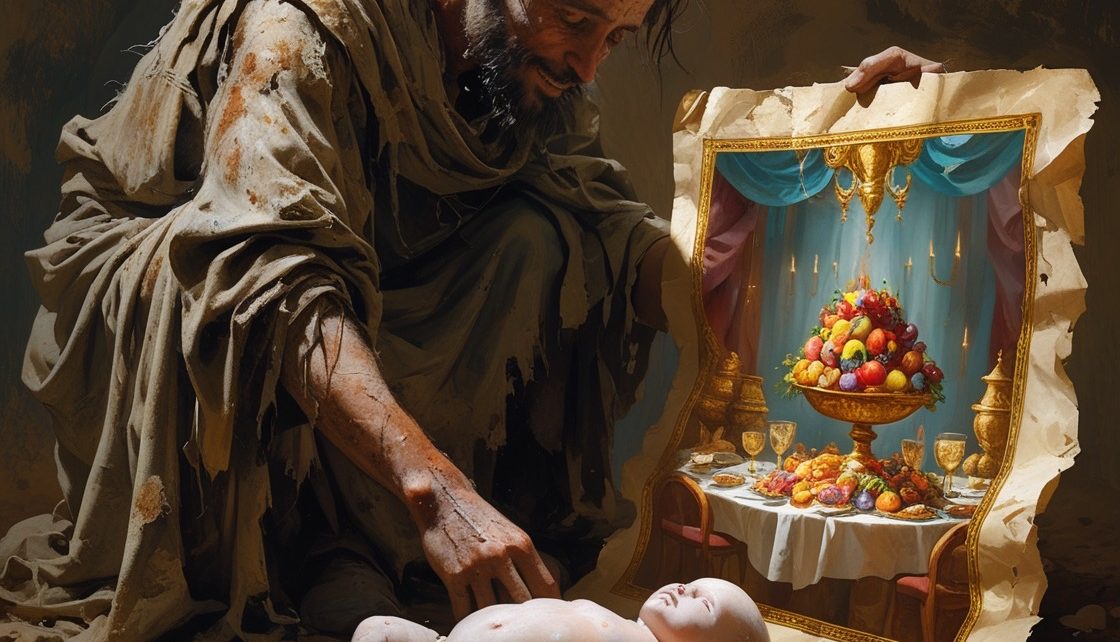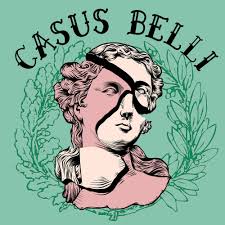Sean Dempsey, 04/01/2025
There was once a king so rich that other kings wept when they heard his name. His majesty, Kaiser My’Kael Sellur, High King of the Lost Isles of Bit’Quon, ruled over a land where wealth dripped from every rooftop and pooled in the gutters. His vaults ran so deep and wide that maps had to be drawn to keep track of the corridors, each lined with towering stacks of gold bars and crates of gems that sparkled like stolen stars.
It was said that when foreign dignitaries visited, he would light the palace chandeliers with rubies instead of candles, simply because firelight on rubies was “more flattering.” His carriages were plated with gold so pure they dented when the wind blew. He once paved an entire road with ornately carved cedar so he wouldn’t have to look at the dirt on his morning ride.
At a banquet for the Queen of the South, he served an entire roasted stag filled with sapphires instead of stuffing. “It is important,” he declared, “to remember that wealth must dazzle, not merely nourish.”
No king had ever held more wealth. And yet, one day, as he stood atop his highest tower, staring out over the sunlit reflection of his golden capital, he felt a gnawing emptiness.
“I possess all the gold that can be mined,” he whispered. “But do I possess enough?”
It was then a man came to court. No one saw from where. He wore a smile far too wide for his face and carried no goods, no packs, not even a purse. Only a long scroll under his arm.
“Sire,” the stranger said with a bow, “I offer you more than gold. I offer you mountains of it. Hills, vaults, towers of gold so vast they stretch into the clouds.”
The king leaned forward. “Show me.”
The man unrolled the scroll. Upon it were drawings—exquisite, glowing renderings of endless piles of gold, magnificent palaces with ceilings of coin, rivers of molten treasure. There were sketches of cities made entirely of gems, and statues forged from bullion stacked higher than cathedrals.
“You see,” the man said smoothly, “you trade a single bar of gold, and in return, I give you an image of a thousand. You will own more gold than ever before—not in weight, but in vision.”
The king was entranced. “So little, in exchange for so much…”
He agreed at once. And so the gold was carried away. Vaults emptied. Scepters melted down. The very crown upon his head was traded for a drawing of a crown so large it could crush mountains. In exchange, the stranger handed him a thick book—filled with the most magnificent illustrations ever inked.
“These,” the man said, “are yours. And they are worth more than all the world.”
The king wept with joy.
Many of the king’s court followed their king’s example. The princes and courtiers first. Second the barons and the dukes. Then the stewards, the sycophants, and even the kitchen staff. Then came the towns-people themselves—so eager were they to follow the example of their king and also become rich. They sold off their cows and their chickens and their meager savings; in this way the wealth of the town was emptied—traded away for ornate and wondrous drawings of fantastic wealth beyond any of their wildest imagination.
Months passed…
But the king and his people soon met with some annoyance. For reasons beyond their ken, merchants did not accept pictures as payment for their wares. The baker would not trade bread for a sketch of a feast. The blacksmith refused a drawing of a thousand anvils. His nobles began to whisper. His people began to flee.
And then, the real darkness began.
Without trade, the kingdom began to starve. Famine stalked the countryside, bloating the bellies of children and blackening the lips of mothers. Fields lay fallow, tools rusted, carts collapsed in the streets. When winter came, it did not leave.
Then came the plague. It arrived like a whisper and bloomed like fire. It took the servants first, then the court. Then the queen. Then the prince. Then all the rest.
The king, still robed in rags stitched from what remained of his golden banners, wandered the shattered capital with his book of gold drawings clutched to his chest, muttering promises to phantoms.
One morning, as the sun refused to rise, the king came upon a small bundle in the snow. A child. A boy, barely more than an infant, skin stretched too tightly over tiny ribs, lips cracked and purple, eyes closed but not peacefully.
The king knelt beside him.
“There, there,” he whispered, brushing matted hair from the infant’s skeletal forehead. “You are in luck, little one. For I am rich beyond imagination. I shall buy you a mountain of bread. A tower of cheese. A sea of milk so vast you’ll never thirst again.”
He opened his book and tore out a page—a splendid drawing of a feast—platters of roast, goblets overflowing with wine, pyramids of fruit. He held it over the boy like a talisman.
“See? It is all yours. You will eat like a prince tonight.”
The child barely stirred.
The king’s voice trembled and his heart bled with overflowing compassion. “Yes… you’ll be well soon, young thing. So very well.”
But the child could no longer hear him.
The king remained kneeling in the snow, mumbling to himself of untold riches no one could touch…while above him, the sky turned gray and forgot how to shine.


